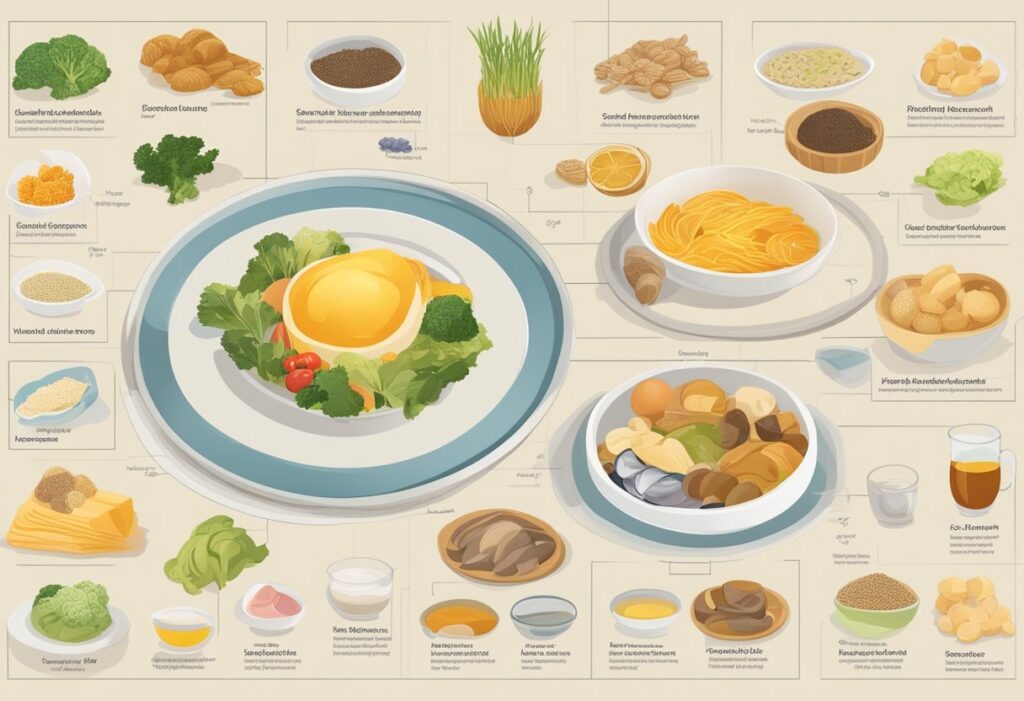Understanding the intricate connection between nutrition and sleep can lead to surprising insights into how one influences the other. A balanced diet not only fuels the body’s daily functions but also profoundly affects sleep patterns and quality. Certain nutrients and food types directly impact the duration and restfulness of sleep, underlining the role of diet as a potential lever for improving sleep health.
Sleep science is complex, involving various hormones and bodily processes that dietary choices can influence. Amino acids like tryptophan are precursors to neurotransmitters such as serotonin and melatonin, which regulate sleep. Meanwhile, excessive intake of stimulants like caffeine can disrupt these processes and impair the ability to fall or stay asleep. On the other hand, certain foods and diets can support better sleep by contributing to relaxation and the natural sleep-wake cycle.
Key Takeaways
- Diet has a direct impact on sleep quality and duration.
- Essential nutrients in food can influence sleep-regulating hormones.
- Modifying dietary habits may improve overall sleep health.
Table of Contents
The Science of Sleep
Sleep is a complex biological process essential for physical health and cognitive function. It involves various mechanisms within the brain and is influenced by several factors, including neurochemicals and behavioral practices.

Understanding Circadian Rhythm
The circadian rhythm is an internal clock that regulates the sleep-wake cycle over 24 hours. External cues like light and darkness influence it. The brain’s suprachiasmatic nucleus (SCN) responds to light signals received through the eyes. It synchronizes the body’s functions with the day-night cycle, promoting wakefulness during daylight and sleep at night. Melatonin, a hormone produced in the pineal gland, plays a pivotal role in this process, signaling the body to prepare for sleep as the environment darkens.
Sleep Stages: REM and Non-REM
Sleep is categorized into two primary types: REM (Rapid Eye Movement) and non-REM, which consists of three stages. Non-REM sleep occupies the majority of a sleeper’s night and includes:
- Stage 1: A light, transitional phase where one can awaken easily.
- Stage 2: A slightly deeper sleep stage where heart rate slows and body temperature drops.
- Stage 3: The period of deep sleep is essential for physical restoration.
REM sleep, on the other hand, is where most dreaming occurs. It plays a critical role in cognitive functions like memory consolidation. During REM sleep, the brain is active, and although the sleeper is in a deep sleep state, the body experiences temporary muscle paralysis.
REM and non-REM sleep are necessary for maintaining overall sleep quality, which various sleep disorders can disrupt. Good sleep hygiene practices, such as maintaining a consistent sleep schedule and creating an optimal sleeping environment, support the natural progression through these sleep stages, promoting better health and well-being. See our REM Sleep post to learn more.
Nutrition Fundamentals
Good nutrition is instrumental in the regulation of sleep patterns and overall health. Eating a balanced diet rich in essential nutrients supports the body’s natural sleep-wake cycles and can improve the quality of rest.
Macronutrients: Roles and Impacts
Proteins, fats, and carbohydrates are the three primary macronutrients the human diet must include in appropriate ratios. They serve as the body’s primary energy source and are essential to maintaining normal body functions.
- Proteins: Proteins comprise amino acids, which play a vital role in the repair and growth of body tissues. They also contribute to the synthesis of hormones and enzymes that regulate sleep.
- Fats: While often vilified, healthy fats are necessary for absorbing fat-soluble vitamins and producing hormones, some of which are involved in sleep regulation.
- Carbohydrates: Carbohydrates are the body’s preferred energy source. Consumption of complex carbohydrates assists in the production of serotonin, a neurotransmitter that promotes sleep.
Micronutrients: Essential Vitamins and Minerals
Vitamins and minerals are micronutrients required in smaller quantities, but they are no less crucial to health and sleep quality.
- Vitamins: Vitamin D, for instance, is pivotal for bone health and has also been associated with sleep duration. Inadequate levels of Vitamin D can impact sleep quality and quantity.
- Minerals: Minerals such as magnesium are involved in over 300 biochemical reactions in the body, including muscle relaxation and nervous system regulation, which can influence sleep patterns. Adequate dietary magnesium may improve sleep quality, particularly for those with insomnia.
Focusing on a diet that includes a variety of nutrients can help maintain overall health and foster a conducive environment for restorative sleep.
Diet and Sleep Quality

The interaction between nutrition and rest can be intricate, with specific diets enhancing sleep quality while others may disrupt it. This section explores how diet influences sleep, identifies which foods are conducive to better sleep, and discusses which foods might hinder a restful night.
How Diet Influences Sleep
Diet directly impacts one’s sleep quality and duration. Intake of specific nutrients and overall dietary patterns can affect aspects of sleep such as its onset, depth, and restorative quality. For instance, research shows a correlation between dietary habits and sleep quality. Diets rich in fruits, vegetables, and healthy fats are associated with better sleep quality. Conversely, excessive calorie intake, especially from sugar and processed foods, can impair sleep, potentially leading to obesity and related conditions such as heart disease and high blood pressure.
Foods That Promote Better Sleep
Certain foods contain components that naturally aid sleep:
- Tart Cherries: Among the few natural sources of melatonin, tart cherries can assist in regulating sleep cycles.
- Milk: Contains tryptophan, which increases sleep-promoting serotonin and melatonin.
- Fatty Fish: Omega-3 fatty acids in fatty fish like salmon may promote sleep by contributing to the production of serotonin.
- Nuts: Almonds and walnuts contain melatonin and essential minerals like magnesium and zinc that are crucial for sleep quality.
- Eggs: They provide vitamin D and are another source of tryptophan.
A narrative review on nutrition and sleep disorders detailed evidence suggesting that specific dietary elements can enhance sleep quality.
Foods to Avoid for Quality Sleep
To maintain optimal sleep quality, individuals should be mindful of their intake of:
- Caffeine: Found in coffee and certain teas, caffeine can significantly reduce total sleep time and quality by increasing alertness and delaying sleep onset.
- Alcohol: Although it may initially induce sleep, alcohol is known to disrupt the second stage of sleep, leading to non-restorative sleep.
- High-calorie Foods and Sugar: Heavy meals and sugar-rich foods can cause discomfort and digestive issues, interrupting sleep.
- Processed Foods: These often contain high levels of sugar and fats that can disturb sleep patterns.
Peer-reviewed studies have investigated the impact of these substances on sleep, confirming that a high intake can lead to disturbances in both sleep quality and duration (PubMed).
Nutritional Impacts on Sleep Disorders

Nutrition plays a crucial role in the management and implications of sleep disorders. It influences hormonal balance and can mitigate or exacerbate conditions like insomnia and obstructive sleep apnea.
Link Between Nutrients and Insomnia
Insomnia, a common sleep disorder characterized by difficulty falling or staying asleep, can be influenced by diet. Research suggests that certain nutrients have the potential to affect sleep through their impact on the nervous system and hormonal pathways. For instance, magnesium, found in foods such as almonds and spinach, has a calming effect and is linked to improved sleep quality. On the other hand, diets high in saturated fats may decrease the production of serotonin, a hormone that aids sleep, leading to difficulty maintaining restful sleep.
Amino acids, particularly tryptophan, are precursors to serotonin and can be found in turkey, eggs, and cheese. They play a role in sleep regulation, and their sufficient intake is associated with reduced insomnia. The relationship between dietary carbohydrates and their effect on tryptophan and serotonin levels also points to possible nutritional strategies for improving sleep in individuals with insomnia. A review of the PMC provides insight into how these nutritional factors influence sleep patterns.
Diet and Obstructive Sleep Apnea
Obstructive Sleep Apnea (OSA) is a severe sleep disorder associated with obesity and characterized by repeated interruptions in breathing during sleep. Weight gain and obesity can exacerbate OSA due to the increased risk of fat deposits that may obstruct airways. Therefore, dietary management focused on weight reduction is often recommended for these patients.
Weight loss strategies for OSA patients include a calorie-restricted diet rich in vegetables, fruits, and whole grains, which are nutrient-dense but lower in calories. Additionally, a balanced diet that includes lean proteins may help manage weight and reduce the severity of OSA symptoms. Clinical implications suggest that those with obstructive sleep apnea should pay careful attention to their dietary habits to manage their condition. Evidence on the connection between diet and sleep apnea highlights the importance of nutritional intervention alongside other treatments.
Behavioral and Lifestyle Factors

Regular physical activity and managing stress levels are pivotal in enhancing sleep quality. These behavioral choices directly affect an individual’s well-being and are closely linked with various physiological processes that govern sleep patterns.
Exercise and Physical Activity’s Role
Regular exercise contributes significantly to one’s overall health, and its benefits extend to sleep quality. It is known to increase the duration of deep sleep phases, which are crucial for physical restoration. However, the timing of exercise plays a role; engaging in vigorous activity close to bedtime may lead to increased alertness and difficulty falling asleep due to elevated levels of norepinephrine. Moderate-intensity physical activity can promote relaxation and readiness for sleep by raising body temperature and allowing it to drop and signal sleep readiness. The type of exercise also matters—yoga, for instance, is associated with increased GABA levels, which can facilitate better sleep.
- Timing: Avoid high-intensity workouts close to bedtime.
- Type: Moderate-intensity activities or yoga can be beneficial.
Stress, Mood, and Sleep
Stress and mood are closely intertwined with sleep. Elevated stress leads to high cortisol levels, commonly known as the stress hormone, which can interrupt sleep patterns. On the other hand, a positive mood can foster better sleep by reducing stress. Presentation of relaxation techniques before bed, such as reading or breathing exercises, can mitigate the impact of stress. Techniques that lower stress can also aid in reducing late-night cortisol production, setting the stage for a restful night.
- Techniques: Practice relaxation methods to lower stress.
- Cortisol: Reduce evening levels through calming activities.
Health Conditions and Sleep

Several health conditions, notably obesity and diabetes, directly affect sleep quality. They can disrupt sleep patterns and exacerbate risks associated with poor sleep, such as hypertension and inflammation, leading to more severe concerns like stroke and cancer.
Impact of Obesity on Sleep
Obesity significantly affects sleep by increasing the likelihood of obstructive sleep apnea (OSA), where breathing stops temporarily during sleep. This is primarily due to excess weight contributing to narrow airways and decreased lung volume. Furthermore, individuals with obesity are at higher risk of developing complications such as hypertension and may experience chronic inflammation, both of which are associated with disrupted sleep patterns.
Diabetes and Its Effect on Sleep
Sleep can be profoundly impacted by diabetes, particularly type 2 diabetes, which is often accompanied by insulin resistance. Volatile blood sugar levels can lead to sleep disturbances; high glucose levels can cause frequent urination at night, while low levels might induce night sweats. Notably, poor sleep can exacerbate diabetes symptoms, creating a challenging cycle of sleep disruption and poor glucose control.
Diet Approaches and Sleep

Diet plays a crucial role in the quality of sleep one can achieve. A proper balance of nutrition and caloric intake is essential to regulate energy throughout the day, leading to more restful nights.
Mediterranean Diet and Sleep Patterns
The Mediterranean Diet is characterized by its abundant use of olive oil, whole grains, and a preference for poultry over red meat. Adhering to this diet may support improved sleep quality. It emphasizes the intake of certain foods associated with better sleep due to their macro and micronutrient profiles.
Balancing Energy: Caloric Intake, Nutrition and Sleep
The relationship between caloric intake and sleep involves managing energy levels through food intake. Consuming too many or too few calories can disrupt sleep patterns. A well-adjusted diet is imperative to maintain the adequate energy needed during the day, which can contribute to healthier sleep habits.
Considerations for Specific Populations
Nutritional needs and the impact of diet on sleep can vary significantly across different populations. Specific guidelines for adults and tailored advice for children and teenagers can help optimize sleep through dietary choices.
Nutritional Guidelines for Adults
Adults should consider the balance of hormones like leptin and ghrelin, which influence sleep regulation. Diets that are rich in fiber but low in saturated fats and sugar have been shown to promote deeper, more restorative sleep phases. These phases are crucial for releasing growth hormone, an essential tissue repair and growth factor. Adults must consume various nutrients to support a healthy lifestyle, including complex carbohydrates, lean proteins, and healthy fats.
Diet and Sleep in Children and Teens
The growth hormone plays a vital role in the development of children and teens, and quality sleep is paramount. A diet that supports healthy growth includes an adequate caloric intake from a balanced variety of food sources. Avoiding caffeine and heavy, rich meals before bedtime can contribute to better sleep patterns, supporting the natural surge in growth hormones during sleep. Maintaining a sleep-promoting diet also helps regulate emotions and cognitive functions that are important for growth and learning.
Frequently Asked Questions

This section addresses common inquiries regarding how nutrition influences sleep quality, focusing on specific dietary components and their effects on sleep patterns and mental well-being.
What types of foods have been linked to improved sleep quality?
Foods that contain melatonin, such as almonds, goji berries, eggs, fish, and tart cherries, have been associated with better sleep. Additionally, those high in magnesium and tryptophan can contribute to improved sleep quality.
How can dietary choices influence insomnia and anxiety?
Poor dietary habits can exacerbate insomnia and anxiety. High sugar intake and caffeine consumption can disrupt sleep, while a balanced diet with adequate tryptophan can have calming effects.
What nutrients are associated with promoting better sleep?
Magnesium, calcium, and vitamins B6 and B12 are nutrients that support better sleep. These substances can help regulate melatonin, which is crucial for maintaining sleep-wake cycles.
In what ways does sleep quality affect mental health and energy levels?
Sleep quality is tightly correlated with mental health and energy levels; poor sleep can lead to increased stress, while adequate rest enhances cognitive function and overall well-being.
Can a low-carb diet lead to sleep disturbances?
A low-carb diet may affect sleep, as carbohydrates are involved in the production of serotonin, which is then converted to melatonin. Reduced carb intake might lead to difficulties in falling and staying asleep.
Are there any correlations between low-calorie diets and insomnia?
Although research is ongoing, restrictive low-calorie diets may contribute to poor sleep due to potential nutrient deficiencies and increased hunger, which could disrupt sleeping patterns and lead to insomnia.


